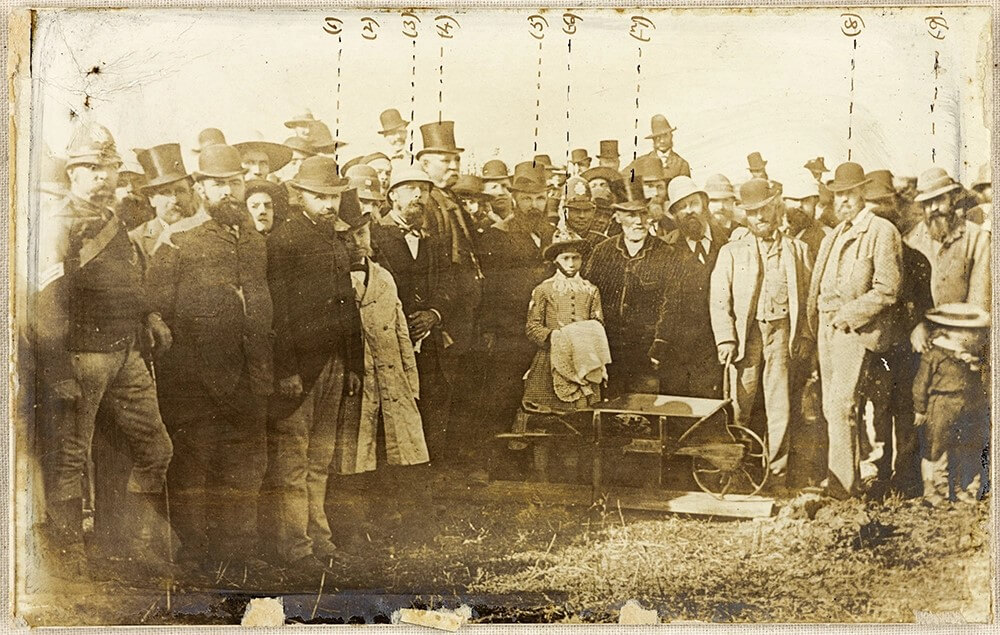
A group portrait of people gathered at the turning of the first sod of the Te Awamutu-Wellington Main Trunk Railway line on April 15, 1885.
The turning of the first sod of the new section of the North Island Main Trunk Railway, from Te Awamutu to Wellington, brought hundreds of passengers on the excursion train from Auckland. On reaching Te Awamutu the Volunteer Cavalry were drawn up, and a cavalcade formed which started for the scene of the ceremony, some two miles away over a crossroad to the south bank of the Puniu river, where the sod was to be turned on land belonging to Rewi’s ancestors.
Mr Hales, District Engineer, asked Wahanui, Ngāti Maniapoto chief, to turn the first sod. Wahanui took off his coat, dug out three sods, and placed them in the barrow, Māori onlookers counting out each sod. The operation was completed amidst loud cheers. Rewi Maniapoto then called upon Mr Stout, MP, to wheel the sods. Mr Stout removed his coat and wheeled the sods along some planks laid for the purpose, and tipped the barrow at the end, throwing the sods on the ground amidst cheering and the Te Awamutu band striking up the National Anthem. Mr Waddell, Mayor of Auckland, then called for three cheers for Her Majesty the Queen, which were heartily given. The Premier addressed the gathering and after Wahanui and other chiefs had replied, the assemblage dispersed and the excursionists returned to the city. The barrow used in the ceremony was the same which Sir George Grey used at Shortland when turning the first sod of the Waikato-Thames Railway.
A popular lecture on Charles Dickens was given in the Ōhaupō school house by the Rev H R Dewsbury. A considerable audience gathered on the occasion and thoroughly appreciated the entertainment. Several extracts from Dickens’ best known works were read by the Reverend generating hearty applause. Musical selections also formed part of the entertainment. The lecture was in aid of the Wesleyan Circuit fund, and a fair sum was raised.
Two aspiring highway men at Kihikihi stuck up a man demanding his money or his life. Instead they were arrested and lodged in the lock up. It was hoped their backs would become acquainted with the birch followed by a short residence in jail and a diet of bread and water. But the busted bandits quite enjoyed their situation and laughed as if the whole affair was a good joke. The leniency of the local benches in dealing so tenderly with larrikins, lest a commitment to jail should contaminate them, caused indignation. Many such lads were thought more likely to contaminate the inmates.
A sports day at Alexandra was attended by a numerous assemblage of well-dressed visitors who were all bent on enjoyment. The scene was a most attractive one, and the weather all that could be desired, not too warm with a slight breeze. The Government paddock, in which the sports were held, presented a most pleasant picture, backed by Pirongia Mountain. The Alexandra Brass Band played and not a single unpleasantness occurred, although owing to one of the stewards bringing in the wrong horse and declaring it the winner, some dividends got into the wrong hands.









